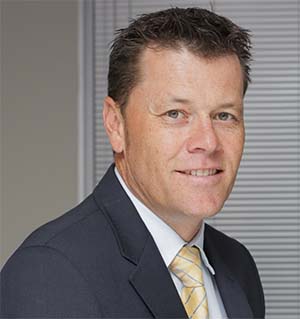It’s been a topsy-turvy few months for the local channel so far this year and the rollercoaster ride looks set to continue into the foreseeable future. While consumer spend hits a downward curve following a boom period during the pandemic, all eyes are on the commercial sector as businesses move towards the ‘new normal’ and the purse strings are loosened on corporate budgets.
There will still be some bumps in the road along the way – supply constraints in certain product categories … a yo-yoing currency exchange rate … decreasing margins – but, as ever, the major players in the channel are cautiously optimistic that the resilience now almost built-in throughout their organisations will once again stand them in good stead.
When reviewing the current state of the channel market and where it’s heading in the coming months, there is arguably no-one better to comment than the man rightfully considered the doyen of South African distribution.
 Neil Rex founded Drive Control Corporation in 1988 and has probably seen it all in distribution in the ensuing 34 years (including, I believe, the delivery to his then Wynberg premises of a couple of giraffes! – Ed). And, over those decades as Managing Director, he’s always been at the helm, been in charge, and been the main architect in building the country’s largest and most successful independent distributor.
Neil Rex founded Drive Control Corporation in 1988 and has probably seen it all in distribution in the ensuing 34 years (including, I believe, the delivery to his then Wynberg premises of a couple of giraffes! – Ed). And, over those decades as Managing Director, he’s always been at the helm, been in charge, and been the main architect in building the country’s largest and most successful independent distributor.
Sadly, his tenure is coming to an end. Rex has finally agreed to relinquish his grip on the Drive Control wheel and has sold the business to a consortium consisting of Kleoss Capital, Fairstone Capital and Sciation. And, as he hands over the reins to new CEO Carlos Ferreira and his team, he’s confident that he’s not only bequeathing them a robust and sound business, but also that the market will be kind to them in their first few months in charge.
“Well my time is now limited, so this will be my last comment [for Channelwise], “ he muses before getting to the nub of the topic.
“The channel finds itself in a positive position even with a slowdown being experienced as the year draws to an end,” he continues. “It also currently finds itself in an overstocked position which is fairly typical after a period of supply constraint. Fortunately, the health of South African distis is such that they can all weather the storm.”
Rex believes that for the foreseeable future the commercial market will be the driving force behind channel business as the consumer market wanes post-pandemic.
“As corporates return to the office environment we expect to see more spend from them due to the need to refresh infrastructure to facilitate this,” he says. “The consumer market I expect to be impacted as inflation rates and interest rates rise.
“It is widely expected that interest rates will rise another 100 basis points and this will increase the pressure on consumers’ disposable income.
“The pressure will be on meeting vendor requirements,” Rex adds. “The corporates will still have X amount of rands in their budgets, but this will now convert to fewer units. So distis and resellers will still generate the rand revenue, but not the dollar revenue and units expected by the vendors.
“We need the vendors to maintain a steady hand on the tiller during this period and not make rash decisions that can unsettle the market,” Rex cautions. “In a strange way, as the units reduce and the revenue stays consistent, certain costs like logistics and handling reduce.”
 Pierre Spies, CEO of the country’s biggest distribution group, Alviva, could be reading from the same script as Rex on the current conditions in the market.
Pierre Spies, CEO of the country’s biggest distribution group, Alviva, could be reading from the same script as Rex on the current conditions in the market.
“The market remains in a state of flux at present and supply continues to be a mixed bag of feast or famine depending on which sector of the market you are addressing,” Spies says. “The consumer market appears to have been hit a lot harder by increased inflation and higher rates than the commercial market. Bearing this in mind, PC vendors seem to have reset expectations, with overall worldwide PC shipments expected to decline approximately 10% this year.
“The commercial market definitely appears to be performing better than the consumer market as consumers are finding they have less disposable income due to inflationary pressures.”
When it comes to supply issues, Spies says it is now higher up the product chain where the most pain is being felt.
“The networking and server market continues to face unprecedented backlogs with lead times ranging from six- to 12-months,” he says. “Some vendors in this space are indicating that inventory levels are only expected to normalise in Q2 2023.”
Spies adds that there are also supply issues emerging within one of the industry’s key sectors – cybersecurity.
“On the cybersecurity front, vendors say there is still a massive backlog, indicating that security remains a top priority as more sophisticated cyberattacks continue to accelerate.”
As ever, though, Spies is optimistic about the remainder of the year.
“We expect a more difficult market, but it’s not all doom and gloom,” Spies says. “There are always opportunities to explore, which is a major benefit of having a wide range of products within the group at our disposal.
“One can always be tempted to over-analyse the market,” he says. “And then do nothing – or very little – and fade away; or continue to remain positive and thrive.”
 Another “elder statesman” of the local channel, Mark Lu, CEO of Corex, says distribution is in the middle of a “Perfect Storm”.
Another “elder statesman” of the local channel, Mark Lu, CEO of Corex, says distribution is in the middle of a “Perfect Storm”.
“Or, as I like to refer to it: ‘The Beer Game’,” he smiles. And any beer drinker worth his ale will relate to Lu’s explanation given the repercussions that are still being felt months later in the beer industry following irrational sales bans during Covid-19 lockdowns.
“The game illustrates the non-linear nature of industrial and economic changes and their effect, and when one small part goes wrong, the knock-on effect can be massive,” Lu explains. “The goal of the game is to run the supply chain as efficiently as possible and to minimise you costs along four stages – factory, distribution, wholesale and retail – and teaches two important lessons: mistakes/misjudgements can take weeks to correct; and behaviour is influenced by the context of the situation.
“Time-lag frustration and accumulation leads to more ordering, and doing so only makes the problem worse.
“The overall game is very simple in that when there is a supply shortage, whether it is caused by too much demand, too little supply, material shortages or logistical issues (in our industry’s case they all count right now) customers/distributors will double or triple their orders or maximise space, and then the minute the market demand changes or slows down, everyone is caught with a ridiculous amount of stock.
“PCs, notebooks, cell phones, TV’s, LCD panels, DRAM, flash, networking, furniture … everyone has been caught by the sudden change to low demand caused by the effective ending of working from home, high inflationary outlook, the energy crisis domestically and globally, and reduced consumer spend,” Lu continues. “Therefore, manufacturers, vendors and distributors are sitting on at least six months’ worth of stock, on average, and we only expect to see some improvements to the situation in Q2 2023 at best.”
Like his counterparts, though, Lu is optimistic that the channel can weather the current storm and that there are still opportunities to be found in the market.
“Cloud is still in strong demand,” he says. “And the demand for cybersecurity is rising dramatically. Also, SMBs are under a lot of pressure when it comes to their digital transformation – it is no longer something that is nice to have; it has become an essential IT strategy to survive.
“Energy is also showing strong demand and we are witnessing a convergence of IT and OT (operation technology) – resellers ahead of the game are using IoT and networking techniques to deploy smart energy, smart buildings and energy management analytics,” he adds.
But he does have one final word of caution.
“Looking at it historically, a strong US dollar is always bad for emerging markets,” Lu warns. “The weakened rand will certainly further deteriorate the outlook of our employment sector, as well as inflation and investment confidence.”
 Lu’s “Beer Game” is an analogy that both Craig Brunsden, CEO of Axiz, and Tim Humphreys-Davies, CEO of Pinnacle, can relate to. As the leaders of South Africa’s two biggest distributors – both part of the Alviva stable – they say that while the first six months of the year may not have been as turbulent as they’ve experienced in past years, it was unpredictable.
Lu’s “Beer Game” is an analogy that both Craig Brunsden, CEO of Axiz, and Tim Humphreys-Davies, CEO of Pinnacle, can relate to. As the leaders of South Africa’s two biggest distributors – both part of the Alviva stable – they say that while the first six months of the year may not have been as turbulent as they’ve experienced in past years, it was unpredictable.
“The first half of 2022 saw some very mixed signals for us,” says Brunsden. “There is no doubt that the PC market has cooled recently after record growth performances after the supply recovered, and we’re now dealing with over-supply of most key brands with market prices under pressure as all players dump stock.
“On the other hand, demand for enterprise hardware brands has been strong, but now they are seeing the severity of the supply challenges the PC business did in 2021,” he adds. “We have strong bookings, but supply ETA’s are up to a year away. Add to this, the volatile exchange rate between the rand and the US dollar, and we have the perfect cocktail of channel craziness.”
Again, though, the resilience and optimism characteristic of channel veterans shines through.
“Even though recent inflation and rand data is scary and difficult to manage at transaction level, I don’t think this all bad news,” says Brunsden. “Demand for technology in the data centre hardware and software arena and, specifically cybersecurity, continues to show good signs for the coming half and bodes well for well-positioned resellers and distributors.
“The issues we are currently faced with work in long cycles and we know that spending patterns move across the different technology categories,” Brunsden says. “The PC market will bounce back and has so far enjoyed the bulk of the spoils of the post-Covid rebound so we’re not concerned.
“As always, a mix of patience, clear strategy and bravery is required to prosper in the channel!” Brunsden says.
 Pinnacle’s Humphreys-Davies echoes his colleague’s sentiments: “The first six months of 2022 were almost like a tale of two halves. In the first quarter, we saw strong demand and a robust market while in the second quarter, supply normalised and demand started tapering in the end user compute space – which was balanced by increased activity in the data centre space. So a bit up and down.
Pinnacle’s Humphreys-Davies echoes his colleague’s sentiments: “The first six months of 2022 were almost like a tale of two halves. In the first quarter, we saw strong demand and a robust market while in the second quarter, supply normalised and demand started tapering in the end user compute space – which was balanced by increased activity in the data centre space. So a bit up and down.
“For the first two months of Q3 we are seeing very much the same as Q2 – a bit of a bumpy ride ahead I think,” Humphreys-Davies adds. “Pricing is always a challenge in a volatile exchange rate environment and supply in certain areas still continues to be a challenge.”
Like many in the channel, the first six months of the year have yielded some bumper results for First Distribution and its sister companies within the Epsidon Group.
“First Distribution, as well as the other distribution companies in the group such as Linux Warehouse, Even Flow and Nology have all had record performances for the first half of this year,” says Tony Abrahall, executive director at First Distribution. “We are seeing demand across all areas of the business including unexpectedly high growth in on-prem solutions, as well as continued growth in public cloud. We are also seeing hyper-growth in our cybersecurity business.
“With the sustained elevated inflation in Europe and the impending recessionary conditions, wisdom says that the current growth rates locally are set to follow Europe and can’t be sustained, and so it would be prudent to expect a significant slowing in the second half, although early signs are indicating that there is still high demand for ICT. Contrary to the demand for infrastructure and cybersecurity, a return to the office has seen a slowing, or normalisation, for demand in end user compute.”
 Abrahall says, however, that there are still challenges lying ahead.
Abrahall says, however, that there are still challenges lying ahead.
“While overall growth remains high, the two biggest challenges we continue to see is margin decline in the channel – both at a distributor and reseller level – and, of course, supply chain constraints,” he says. “Supply chain issues are now more limited to networking products although this is having a profound impact on our ability to deliver complete solutions. Brand loyalty has gone out of the window when it comes to networking in general, and customers are taking what they can get which is opening new challengers to incumbent networking vendors.
“Overall, I think the ICT market is performing well above expectations, but a slowdown is on the cards, and short-term we will still be hampered by some supply chain issues in specific technology areas,” Abrahall says.
Supply chain issues have been a predominant theme throughout this story and it has been no different for Rectron, as CEO Spencer Chen, explains.
“At the beginning of 2022, the supply chain started to normalise for most of IT edge computing while some product lines remained challenging,” Chen says. “At the same time, there were improvements in cost of shipping and availability of stock as Covid-19 restrictions were lifted. The channel has also seen a post-pandemic uptake from business compared to the past two years when the work/study from home demand was greater.
“Locally, an increase in petrol prices, load shedding and a high exchange rate have had a great impact on the economy and cost of products, adding pressure to businesses and consumers. To offset these tough conditions and open opportunities for new revenue streams, distributors and resellers need to look at diversifying their products and services and add value, such as by offering pre-sales assistance and first-line technical support, and exploring new partnerships that are business differentiators.
“Looking ahead, the channel should focus on going beyond traditional tech offerings to meet the current demands of businesses and consumers,” Chen says. “At Rectron, for example, we are building on our power solution portfolio to help South Africans overcome the challenges of the country’s unstable power situation. We are also increasing our offering to support sectors that were heavily affected by the pandemic, but are now slowly recovering such as travel, manufacturing, hospitality and retail.
“The channel also needs to align with industry trends, such as digitalisation and hybrid working models,” Chen adds. “For us, this means strengthening cloud services, edge computing and data centre solutions, as well as drone technology, which drives efficiency and innovation in industries like mining and construction which play a significant role in economic development.”
 Gary Pickford, chief commercial officer of Tarsus Distribution, says the resilience of the local channel – and of South Africans – has come to the fore during what has been a fairly tough few months.
Gary Pickford, chief commercial officer of Tarsus Distribution, says the resilience of the local channel – and of South Africans – has come to the fore during what has been a fairly tough few months.
“The channel, from our perspective, has been remarkably resilient considering the external factors that have made the environment difficult to operate in over the past few months,” Pickford says. “There is no doubt that the consumer segment might have slowed down due to inflationary pressure and restricted cash-flow, but our commercial segment is robust as corporates continue to invest in the latest tech that will help them operate in the world of hybrid work.
“In addition, we see high demand for our cybersecurity solutions as corporates upgrade and protect their environment,” he continues. “Connectivity and edge computing has made sure that our networking business continues to grow. Our print business has also seen an increase in demand since corporates returned to work after the Covid lockdown.
“I think we are lucky to be part of the tech industry that continues to experience growth and ongoing demand, and we expect to see this continuing for the rest of the year. With over 250 000 mid- and small-sized businesses in South Africa there are many CEO’s and business owners looking to partner with their technology reseller and invest in the tech that will make them more efficient, more resilient, and more competitive. Obviously, we will see some slowdown due to global supply chain issues that are not within our control but, on the whole, South Africa has shown some remarkable resilience in managing our inflationary pressure and we expect this resilience to continue.
“At Tarsus Distribution we acknowledge that there are some headwinds we will all need to face in the coming months, but we will focus on the factors that are in our control, rather than the factors that are not,” Pickford says. “Volatile exchange rates, a fluctuating oil price, supply constraint challenges are not in our control. But customer centricity, employee satisfaction, superior logistical service, fast quote turnaround time and product availability are all in our control, and we will make sure that we focus on these factors to add value to our partners.
“In the months to come, we see a weaker oil price that will hopefully result in a reduction in inflationary pressure and some consumer confidence might return to our market as our Eskom challenges are resolved through some innovative private sector energy solutions.
“South Africans are resilient, and our industry is the best representation of this resilience,” Pickford says.
